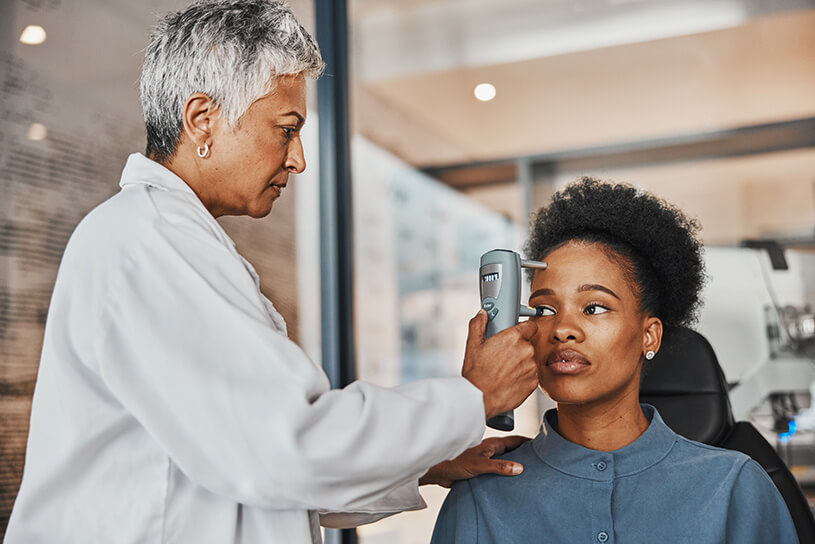Simply Business has partnered with Mental Health at Work, a programme curated by Mind, to support the UK’s self-employed with their mental health and wellbeing.
Together we surveyed more than 700 small business owners to understand their challenges. Now we want to start a conversation and end the stigma surrounding mental health at work through our Mind Your Business initiative.
Whatever the size of your business, occupational health is important for looking after the physical and mental health of your employees.
It’s about preventing health issues as well as adapting your workplace to support people’s needs, health, safety, and wellbeing. From identifying potential hazards to making reasonable adjustments if someone has a disability, occupational health should be a priority for all businesses.
But how do you do an occupational health assessment? And why is occupational health important? This small business guide will help you look after your people at work, whether you have one employee or a large team.
What is occupational health?
Occupational health (OH) is a medical service that looks after people’s health, safety, and wellbeing while at work. This looks at both the impact a working environment can have on an employee’s health (for example excessive noise on a construction site), and how their health can affect their ability to do their job.
Businesses might choose to refer someone to occupational health services if they have concerns about their health at work. For example, if someone in your team has been absent with a long-term illness, an occupational health assessment can help with identifying ways to adapt their working environment and make their return to work easier.
Occupational health and mental health
In the workplace, things like excessive workload, discrimination and inequality, and being undervalued can contribute to poor mental health.
For example, if someone’s expected to do too much work for one person, the pressure can cause stress and burnout. Not only is this a concern for their mental health and wellbeing, but this can also result in time off sick and impact your team and the business.
What are the different types of occupational health?
Safety, hygiene, psychology, ergonomics, and nursing are just a few of the main areas covered by occupational health. This includes things like:
- display screen equipment assessments
- disability evaluation
- sickness absence management
- ergonomics (assessing seating, posture, desk setup)
- risk assessments (looking at hazards that could cause injury or sickness)
- health promotion and wellbeing at work
- workplace immunisations
Benefits of occupational health services
As an employer and small business owner, you’ll be concerned both about making your business a success and looking after your employees. The two go hand in hand.
Investing in occupational health services can help you to:
- save money – looking after your people’s health and wellbeing can reduce time off in sickness and the impact this has on your business
- keep your people happy – creating a healthy working environment is one way you can encourage employee retention so people want to continue working for you
What is an occupational health assessment?
An occupational health assessment is done by a qualified clinician, usually an OH doctor or nurse.
As a smaller business, you’re unlikely to employ an in-house occupational health professional. Instead, you might want to look into third-party organisations who have trained teams to do this for you.
The NHS offers occupational health services and you can find NHS occupational health providers near you using their map tool.
Insurance and occupational health
Industries like construction, manufacturing, and wholesalers, for example, come with complex risks so occupational health is even more important. Noisy factories, vibration from operating machinery, and exposure to harmful chemicals are just some of the risks occupational health can help check.
That’s why it’s important to have the right business insurance to protect you, your employees, and your business. This might include:
- employers’ liability insurance – a legal requirement if you employ anyone
- public liability insurance – can cover legal expenses or compensation claims if a member of the public suffers injury or damage because of your business
- commercial combined insurance is tailored for bigger businesses with complex risks

Photograph: sirichai/stock.adobe.com
What questions are asked at an occupational health assessment?
An occupational health professional asks questions about a person’s health and what would support them to do their job.
This could be around any underlying health conditions, a disability, menopause, or anything that might mean they need reasonable adjustments to their working environment.
If you’ve referred someone for an OH assessment because they’ve had a period of absence from work, for example as a result of stress or burnout, then the clinician would ask about the causes and what could support them.
What legislation covers occupational health and safety?
The Health and Safety at Work Act 1974 also covers occupational health and your responsibilities as an employer.
Meanwhile, the Equality Act says that employers must make any reasonable adjustments for disabled people if they face a substantial disadvantage in the workplace. For example, this could be allowing flexible working, adjusting their desk or work environment, or providing equipment to support them.
Reasonable adjustments should also be made for those with physical or mental health conditions so they’re not disadvantaged at work.
Is occupational health a legal requirement for employers?
As mentioned above, you’re legally required to protect the health and safety of your employees, and occupational health falls into this. You might not have a formal OH policy but you need to work with your people and their GP if you think there’s a cause for concern.
How to create an occupational health policy
An occupational health policy should include information on:
- the process for referring or assessing occupational health
- what happens in an occupational health assessment – who’s involved? When does it happen?
- your responsibilities as an employer
- the responsibilities of your staff
- what happens after an OH assessment
Make sure to include this in your staff handbook so your people know what support is available to them.
Improving access to occupational health services
Large employers are five times more likely to offer occupational health services than small businesses, according to a government report. But a new research and development fund has been created to improve innovation and access to these services for micro and small businesses.
Minister for Disabled People, Health and Work, Tom Pursglove MP, said: “Good occupational health within workplaces is vital in supporting our overall health and standard of living. We spend so much of our lives at work, and it is imperative that our employers can give us the support we need to maintain our physical and mental health. This in turn means we can give our best at work.”
Chancellor Jeremy Hunt also used his Spring Budget announcement to reveal plans to get people back into work by expanding resources and health checks. There’s not much detail yet, but The Times reported in the lead up to the Budget that this could include blood pressure and BMI tests, as well as funding for small businesses to help them towards the cost of OH services.
HR guides and policies for small businesses
- HR toolkit: what HR tools do growing businesses need?
- The Bradford Factor – how to manage absence at work
- What is a mental health first aider?
- How much employers’ liability insurance do I need?
Visit Mental Health at Work’s dedicated Self-Employed Support Hub for toolkits, resources and powerful stories to help improve workplace wellbeing.
Have you done an occupational health assessment for your small business? Let us know your experience in the comments.
Looking for self-employed insurance?
With Simply Business you can build a single self employed insurance policy combining the covers that are relevant to you. Whether it’s public liability insurance, professional indemnity or whatever else you need, we’ll run you a quick quote online, and let you decide if we’re a good fit.
Photograph: Coetzee/peopleimages.com/stock.adobe.com
